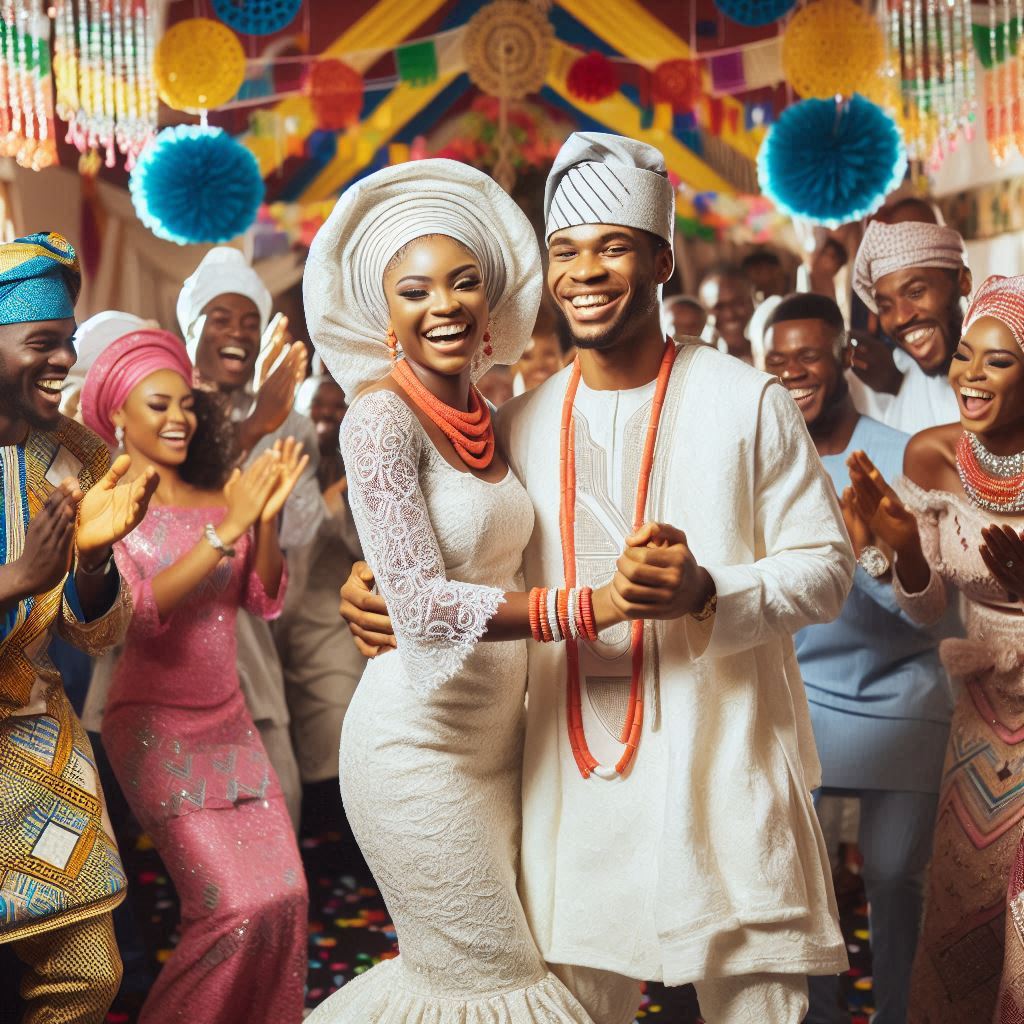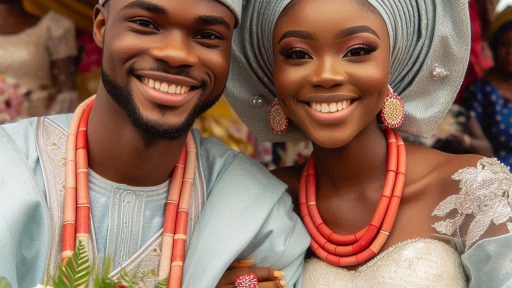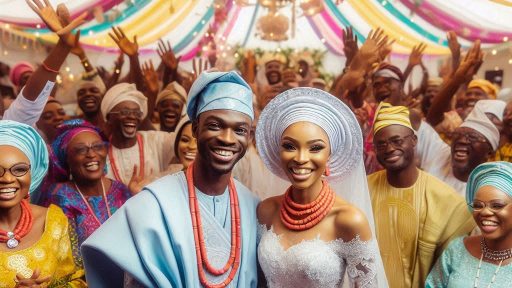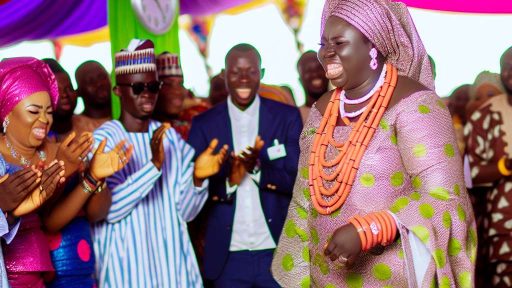Introduction
Overview of marriage in Nigeria and the significance it holds in Nigerian culture
In Nigeria, marriage is not just a union between two individuals but a merging of families and cultures.
It holds great significance in Nigerian culture, with various traditions and customs that are followed religiously.
Intricate Traditional Wedding Ceremonies
Nigerian weddings are colorful and festive events that showcase the rich cultural heritage of the diverse ethnic groups in the country.
From the Yoruba to the Igbo and Hausa tribes, each has its unique customs and rituals that are observed during the wedding ceremony.
The Importance of Dowry
Dowry, known as “bride price,” is a significant part of marriage in Nigeria.
It is a token given by the groom or his family to the bride’s family as a sign of appreciation and commitment.
The negotiation of the dowry is a crucial aspect of the marriage process and symbolizes the merging of two families.
Polygamy is Still Practiced
In Nigeria, polygamy is legal and widely practiced, particularly among certain ethnic groups and religious affiliations.
While it is more common in rural areas, some urban dwellers also embrace polygamous relationships, often due to cultural or religious beliefs.
The Role of Family in Marriage
Family plays a significant role in Nigerian marriages.
From arranging introductions to giving approval for the marriage, families are actively involved in the decision-making process.
The support and blessings of both families are crucial for a successful union.
Influence of Religion on Marriage
Nigeria is a religiously diverse country, with Christianity and Islam being the dominant faiths.
Religious beliefs and practices heavily influence marriage customs, such as the type of ceremony conducted and the roles of the bride and groom in the marriage.
Celebrations and Festivities
Marriage is seen as a joyous occasion in Nigeria, marked by elaborate celebrations that may last for days.
Traditional music, dances, and feasts are common features of Nigerian weddings, bringing together friends and family to celebrate the union of the couple.
Divorce and Remarriage
While divorce was traditionally frowned upon in Nigerian society, attitudes are gradually changing.
Divorce rates are increasing, particularly among urban couples, due to factors such as infidelity, incompatibility, and financial issues.
Remarriage is also becoming more common, with individuals seeking happiness and companionship after a failed marriage.
Traditional marriage customs
Traditional marriage customs in Nigeria vary among different ethnic groups, each with its unique ceremonies and traditions.
Detailed explanation of traditional marriage ceremonies in different ethnic groups in Nigeria
Yoruba Traditional Marriage
In Yoruba culture, marriage is a significant event that involves elaborate ceremonies, including the engagement, introduction, and the actual wedding ceremony.
- Engagement Ceremony: The groom’s family presents gifts to the bride’s family as a sign of their intentions.
- Introduction Ceremony: This is where both families meet and formalize the marriage plans.
- Wedding Ceremony: The traditional wedding involves rites, prayers, and feasting to celebrate the union.
Igbo Traditional Marriage
Igbo traditional marriage ceremonies are colorful and involve several stages that highlight the rich cultural heritage of the Igbo people.
- Knocking Ceremony: The groom visits the bride’s family with his relatives to seek her hand in marriage.
- Bride Price: The groom’s family presents gifts and items to the bride’s family as part of the marriage negotiations.
- Wine-Carrying Ceremony: The bride carries a cup of palm wine to her parents to symbolize her acceptance of the groom.
Hausa Traditional Marriage
Marriage in the Hausa culture is steeped in tradition and customs that reflect the values and beliefs of the Hausa people.
- Proposal: The groom’s family sends representatives to the bride’s family to ask for her hand in marriage.
- Religious Ceremonies: Islamic rites are an integral part of Hausa weddings, including recitation of prayers and blessings.
- Feasting: A grand feast follows the wedding ceremony, where family and friends celebrate the union with traditional Hausa dishes.
Despite the diversity in traditional marriage customs in Nigeria, certain elements such as the payment of bride price, exchange of gifts, and ceremonial rites are common across different ethnic groups.
These customs not only strengthen family ties but also serve as a way to preserve cultural heritage and values within Nigerian communities.
While modern influences may have influenced some aspects of traditional marriage practices in Nigeria, the essence and significance of these customs remain deeply ingrained in the fabric of Nigerian society.
Overall, the traditional marriage customs in Nigeria are a reflection of the country’s diverse cultural landscape and a testament to the importance of family and community in Nigerian society.
Marriage age
One of the most significant aspects of marriage in Nigeria is the age at which individuals tie the knot.
Here, we will explore the average age at which Nigerians get married and the various factors that influence this decision.
Average Marriage Age in Nigeria
On average, Nigerians typically get married between the ages of 25 and 30.
This age range is considered the prime time for marriage, as individuals are usually settled in their careers and financially stable.
Factors Influencing Marriage Age
- Cultural Expectations: In Nigeria, there is a strong emphasis on family and societal expectations when it comes to marriage.
Individuals may feel pressured to get married at a certain age to adhere to these cultural norms. - Educational Attainment: The level of education plays a significant role in determining the marriage age.
Individuals who pursue higher education tend to delay marriage until they have completed their studies and established their careers. - Religious Beliefs: Religion also plays a vital role in influencing the marriage age in Nigeria.
Some religious beliefs encourage early marriage, while others promote waiting until a certain age or stage in life. - Financial Stability: Financial considerations are crucial when it comes to marriage.
Many Nigerians prefer to wait until they are financially stable before getting married, as they want to provide for their future family. - Family Pressure: Pressure from family members, especially parents, can impact the marriage age.
Some families expect their children to marry early, while others may be more lenient and allow them to marry when they are ready.
Regional Variances
It is essential to note that there are regional differences in marriage age within Nigeria.
Urban areas tend to have a higher average marriage age compared to rural areas.
This can be attributed to factors such as access to education, exposure to different cultures, and job opportunities.
Basically, the average marriage age in Nigeria falls between 25 and 30, with various factors influencing this decision.
Cultural expectations, educational attainment, religious beliefs, financial stability, and family pressure all play a crucial role in determining when individuals get married.
Read: Avoiding Marriage Fraud: Tips for Genuine US Weddings
Polygamy
The practice of polygamy in Nigeria and its acceptance in certain regions
Polygamy remains a prevalent practice in Nigeria, rooted deeply in cultural and religious traditions.
Although Western influences have shaped modern marriage practices, polygamy continues to thrive in various regions.
Cultural Significance
In many Nigerian communities, polygamy signifies wealth, status, and social influence. Men with multiple wives are often viewed as successful.
The number of wives a man has can reflect his economic stability, especially in agrarian societies.
Here, more wives mean more hands to work the land and contribute to the household.
Regional Acceptance
Polygamy is more common in the northern regions of Nigeria, where Islamic traditions dominate.
Under Islamic law, men are permitted to marry up to four wives, provided they can treat them equally.
This practice is widely accepted and integrated into the cultural fabric of these communities.
In contrast, the southern regions, influenced by Christianity and Western norms, generally discourage polygamy.
However, it still exists, particularly in rural areas where traditional beliefs hold strong.
Some ethnic groups in the South, like the Yoruba, also practice polygamy, although it’s becoming less common.
Legal and Religious Context
Nigerian law accommodates polygamy under customary and Islamic laws.
Customary law, practiced by various ethnic groups, often permits polygamy, reflecting long-standing traditions.
Islamic law, as mentioned, allows up to four wives, with specific guidelines for fairness.
On the other hand, civil law, influenced by Western ideals, does not recognize polygamous marriages.
Couples married under civil law must adhere to monogamy.
This legal duality highlights the complex nature of marriage practices in Nigeria.
Social Dynamics
Polygamy affects family dynamics in various ways.
The structure of a polygamous family can lead to competition among wives for resources and attention.
However, in some cases, wives form strong bonds and support systems, working together for the household’s benefit.
Children in polygamous families may experience different upbringing styles, depending on the wife’s position and influence within the family.
The relationship between siblings from different mothers can range from close-knit to distant, influenced by their mothers’ relationships.
Economic Considerations
Economically, polygamy can be both a burden and a benefit.
On one hand, a larger family means more dependents, increasing the financial responsibility on the husband.
On the other hand, it can lead to greater wealth generation, especially in communities where communal labor is valued.
Changing Attitudes
Despite its deep roots, attitudes towards polygamy are gradually changing.
Urbanization, education, and exposure to global norms are influencing younger generations.
Many now view monogamy as a more practical and equitable marital structure.
In general, polygamy in Nigeria reflects a blend of tradition, religion, and cultural identity.
While it remains accepted in certain regions, evolving societal values may reshape its future.
Understanding these dynamics is crucial for grasping the complexities of marriage in Nigeria.
Read: Busting Myths: Nigerian Marriage and Citizenship Facts

Religious influence
How religion plays a significant role in marriage ceremonies and practices in Nigeria
One of the most fascinating aspects of marriage in Nigeria is the significant role that religion plays in the entire process.
Religion is deeply woven into the fabric of Nigerian society, and it influences every aspect of life, including marriage ceremonies and practices.
Diversity of Religious Beliefs
Nigeria is a highly religiously diverse country, with Christianity and Islam being the two major religions.
In a marriage setting, the religious beliefs of the couple and their families often dictate the type of ceremony that will be conducted.
For Christian marriages, there are typically church ceremonies that involve the exchange of vows, prayers, and blessings from a pastor or priest.
On the other hand, Muslim marriages may involve a Nikkah ceremony conducted by an Imam, which includes the signing of a marriage contract in the presence of witnesses.
Pre-Marital Counseling
In many Nigerian religious traditions, pre-marital counseling is an essential part of the marriage preparation process.
This counseling is usually conducted by religious leaders who provide guidance on building a strong foundation for the marriage.
During these counseling sessions, couples may discuss a wide range of topics, including communication, conflict resolution, finances, and family planning.
The goal is to help the couple understand each other better and prepare them for the challenges of married life.
Incorporation of Religious Customs
Religious customs and traditions are deeply ingrained in Nigerian marriage ceremonies.
For example, in Igbo culture, the Igba Nkwu ceremony is a traditional marriage ceremony that involves the breaking of kola nuts as a symbol of peace and unity.
Similarly, Yoruba weddings often include traditional rites such as the presentation of gifts to the bride’s family, the tying of the wedding gele (headgear), and the spraying of money on the couple as a sign of prosperity.
These customs are meant to honor the cultural and religious heritage of the couple.
Influence on Family Dynamics
Religion also plays a significant role in shaping family dynamics in Nigerian marriages.
In many cases, the religious beliefs of the couple may influence decisions regarding family planning, child-rearing practices, and even the roles and responsibilities of each spouse within the marriage.
Also in some Christian traditions, the husband takes the role of head of the household, while the wife supports and remains submissive.
In contrast, some Muslim families may have more traditional gender roles, with the husband as the provider and the wife as the caregiver.
Permanence and Commitment
Religion also emphasizes the importance of permanence and commitment in Nigerian marriages.
Both Christianity and Islam view marriage as a sacred union that should be entered into with the intention of lifelong commitment and fidelity.
Religious communities generally discourage divorce and encourage couples to work through differences with counseling or mediation first.
The belief is that with faith and commitment, any marriage can weather the storms of life.
Influence on Wedding Attire
Religious beliefs also influence the choice of wedding attire in Nigerian ceremonies.
In Christian weddings, the bride often wears a white gown as a symbol of purity and innocence, while the groom may wear a suit or traditional attire.
On the other hand, Muslim brides typically wear a hijab or headscarf along with a modest dress, in keeping with Islamic principles of modesty and humility.
The groom may wear a traditional agbada or dashiki to reflect his cultural heritage.
Festive Celebrations
Finally, religion plays a significant role in the festive celebrations that accompany Nigerian marriage ceremonies.
Both Christian and Muslim weddings are typically grand affairs with elaborate decorations, feasting, music, and dancing to celebrate the union of the couple.
These celebrations often last for several days and involve the entire community coming together to offer their blessings and support to the newlyweds.
Religious songs, prayers, and rituals are also a central part of the festivities, highlighting the spiritual significance of the marriage union.
In a nutshell, religion plays a central role in shaping every aspect of marriage in Nigeria, from the ceremony itself to the beliefs and practices that guide the couple throughout their married life.
Religion influences the rituals, customs, and traditions upheld during the marriage process. It also shapes the values of commitment, unity, and faith that underpin every Nigerian marriage.
Read: Gift Ideas for Nigerian Marriage Functions: A Handy Guide
Bride price
One of the most intriguing aspects of marriage in Nigeria is the tradition of bride price.
This tradition involves the groom’s family presenting gifts, usually in the form of money or goods, to the bride’s family as a sign of respect and appreciation.
The importance of Bride Price in Nigerian Marriages
Symbol of Appreciation
The bride’s family views bride price as appreciation for raising and caring for their daughter.
It acknowledges the efforts and sacrifices made by the bride’s family in raising the bride.
Strengthening Family Bonds
By exchanging gifts during the bride price ceremony, families on both sides form a bond that goes beyond just the union of the couple.
It brings the families closer and fosters unity and cooperation between them.
Sign of Commitment
Paying bride price is a way for the groom to demonstrate his commitment to his bride and her family.
It shows that he values and respects her enough to go through the traditional customs and rituals of marriage.
Financial Security
For the bride’s family, the bride price serves as a form of financial security.
In some cases, the money or goods received as bride price are used to support the bride or her family, especially in times of need or emergencies.
Tradition and Culture
Bride price is deeply rooted in Nigerian culture and tradition.
It is seen as a custom that must be upheld to preserve the customs and practices of the community.
It is a way of honoring the ancestors and maintaining the cultural heritage passed down through generations.
Legal Recognition
Some Nigerian communities legally require the payment of a bride price for a marriage to be recognized.
It is a mandatory step in the marriage process, ensuring the marriage is legally valid. Without it, the marriage may not be recognized by law.
Social Status
The amount of bride price paid can also be a reflection of the social status and wealth of the families involved.
A higher bride price may signify the prestige and standing of the groom’s family, while a lower bride price may indicate more modest means.
Overall, the tradition of bride price in Nigerian marriages is a complex and nuanced practice that holds great significance for the families involved.
It is a custom that has survived for generations, reflecting the values, beliefs, and customs of Nigerian society.
Read: The Role of Families in Nigerian Proposals: What to Know
Divorce rates
Statistics on divorce rates in Nigeria and the factors contributing to the rise in divorce cases
Divorce rates in Nigeria have been steadily rising over the years.
The changing dynamics of society play a significant role.
According to recent statistics, divorce rates in Nigeria have increased by over 14% in the last decade.
This trend has caught the attention of many, prompting discussions on the factors driving this rise.
Changing Social Norms
Social norms in Nigeria have evolved, influencing marriage expectations.
Traditionally, marriage was viewed as a lifelong commitment, regardless of challenges.
Today, people are more willing to seek divorce when unhappy, leading to increased cases.
Economic Factors
Economic stress contributes significantly to rising divorce rates.
Financial instability creates tension in marriages, often leading to irreconcilable differences.
Couples facing unemployment, debt, or low income struggle to maintain harmony, pushing them toward separation.
Urbanization and Migration
Urbanization and migration impact marriages in Nigeria.
Couples moving to cities or abroad face new challenges.
The stress of adjusting to urban life, combined with long-distance relationships, often strains marriages, resulting in higher divorce rates.
Influence of Western Culture
Western culture has influenced Nigerian marriages.
Exposure to Western values has changed perspectives on marriage and divorce.
Couples are more open to ending marriages that do not meet their expectations, mirroring Western practices.
Increased Awareness and Legal Access
Awareness of legal rights and easier access to divorce proceedings contribute to the rise in divorce cases.
In the past, divorce was stigmatized and difficult to obtain.
Today, more Nigerians understand their rights and are willing to pursue divorce when necessary.
Infidelity and Trust Issues
Infidelity remains a leading cause of divorce in Nigeria.
Trust issues often arise from infidelity, leading to irreparable damage.
When trust is broken, couples struggle to rebuild their relationships, resulting in divorce.
Domestic Violence
Domestic violence is another significant factor in rising divorce rates.
Women, in particular, are increasingly unwilling to endure abusive relationships.
With growing awareness and support systems, more victims of domestic violence are choosing to leave abusive marriages.
The rise in divorce rates in Nigeria is influenced by various factors, including changing social norms, economic stress, urbanization, Western culture, and legal awareness.
Infidelity and domestic violence also play critical roles in the decision to divorce.
As society continues to evolve, so do the dynamics of marriage, leading to more couples opting for separation when faced with insurmountable challenges.
Understanding these factors can help couples navigate their relationships more effectively and foster stronger, healthier marriages in the future.
Modern influences
One of the most significant aspects of marriage in Nigeria is how modern influences, including modernization and globalization, have impacted marriage customs and practices in the country.
Changes in Marriage Customs Due to Modernization and Globalization
Here are some fascinating facts about how modern influences have influenced marriage in Nigeria:
- Changing Gender Roles: With the rise of modernization and globalization, there has been a gradual shift in traditional gender roles within marriages in Nigeria.
Women are now more empowered and actively involved in decision-making processes. - Introduction of Dating: Traditionally, marriages in Nigeria were arranged by families, but with modern influences, dating has become more common.
Young people now have the freedom to choose their partners before marriage. - Impact of Social Media: Social media has played a significant role in changing the way people meet and interact.
Many couples in Nigeria now meet through social networking platforms, which was unheard of in the past. - Interethnic Marriages: Modern influences have also led to an increase in interethnic marriages in Nigeria.
With globalization, people from different ethnic groups are now more open to marrying outside their tribe. - Legal Reforms: Modernization has brought about legal reforms that have impacted marriage in Nigeria.
For example, the legal age for marriage has been raised to help combat child marriage in the country.
Overall, it is evident that modern influences have brought about significant changes in marriage customs and practices in Nigeria.
While some traditional values are still preserved, the influence of modernization and globalization cannot be ignored.
Conclusion
Marriage in Nigeria is steeped in rich cultural traditions and practices that make it unique.
- Lavish Weddings: Nigerian weddings are known for their extravagant celebrations that can last for days.
- Dowry Payments: Dowry payments are an essential part of marriage negotiations in Nigeria, symbolizing the groom’s commitment.
- Polygamy: Polygamy is legal in Nigeria and practiced in various regions based on cultural and religious beliefs.
- Customary Marriage: Traditional marriage ceremonies in Nigeria involve rituals, ceremonies, and family blessings.
- Arranged Marriages: In some Nigerian cultures, marriages are arranged by families without the couple’s direct involvement.
- Religious Influence: Religion plays a significant role in Nigerian marriages, with Christian and Islamic traditions shaping marital practices.
- Changing Trends: Modern influences, such as social media and changing societal norms, are impacting marriage dynamics in Nigeria.
In review, marriage in Nigeria is a blend of tradition and modernity, with cultural practices shaping marital unions.
The diversity of customs, the influence of religion, and the evolving trends in marriage highlight the uniqueness of the institution in Nigeria.
The rich tapestry of Nigerian weddings reflects the country’s cultural heritage and the importance placed on family and community bonds.




